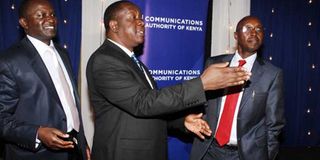Don’t make universal service charge a tax

From left, Jamleck Kamau, the chairman of the parliamentary Committee for Energy, Information and Communication; Fred Matiangi, the Information, Communication and Technology Cabinet Secretary; and Ngene Gituku, the chairman of the Communications Authority of Kenya's board of directors at the inauguration of the authority's board of directors and the Universal Service Advisory Council in Nairobi on July 30, 2014. PHOTO | SALATON NJAU | NATION MEDIA GROUP
What you need to know:
- One of industry players’ greatest concerns in this country is that the USF be rolled out as an enabler, not as a disabler, of the sector.
- It is a pity that industry stakeholders find themselves relegated to the awkward position of having to transact business with inflexible bureaucrats.
- The constitution of the USAC must be in line with Section 102k of the Kenya Information and Communications Act. The USAC must become a jointly developed structure, with mutual respect, authority, accountability and responsibilities.
The proposed Universal Service Charge mooted by the Ministry of Information and Technology has seen industry players raise critical concerns around three main issues.
These are representation of licensees in the Universal Service Advisory Council (USAC); clarity around the Fund’s objectives, considering that the last access gap study is now more than five years old; and the Fund’s financial governance and accountability to those contributing.
Industry players are more than eager to support the establishment of a successful USF in Kenya. We fully appreciate that universal service is one of the first principles in communications services. Simply put, it is the principle that all Kenyans must have access to communications services, even in the most far-flung and remote areas.
The most mature jurisdictions, for instance the USA, also have universal service as an implementation fund.
One of industry players’ greatest concerns in this country is that the USF be rolled out as an enabler, not as a disabler, of the sector. In other words, USF must not have a false start in Kenya.
Above all, it must not become just another tax levied on licensees of the Communications Commission of Kenya.
The first bad sign of USF degenerating into a time- and money-wasting false start has been the manner in which those expected to contribute to the Fund have been side-lined from its formation and shut out from membership of the USAC.
The rolling out of the USF under the oversight of the USAC needs to be the most intensively consultative and broadly collaborative endeavour from the word Go. It is a pity that industry stakeholders find themselves relegated to the awkward position of having to transact business with inflexible bureaucrats.
The pitfalls of non-cooperation and non-collaboration are unacceptable. For Kenyans’ sake, let all stakeholders and USF-USAC enter a mutually beneficial and structured relationship to achieve the common goal of value-for-money service and product delivery.
MUTUAL RESPECT
The constitution of the USAC must be in line with Section 102k of the Kenya Information and Communications Act. The USAC must become a jointly developed structure, with mutual respect, authority, accountability and responsibilities.
The synergies and assurances of inclusivity that industry stakeholders are seeking so fervently do not in any way detract from the ministry’s esteem.
We are not usurpers and neither are we cutting corners. All we want is that emergent legislation in our sector have the enabling effect of, for instance, the US Telecommunications Act of 1996.
This seminal Act had the goal of Universal Service increasing access to telecommunications and digital era services such as high-speed Internet for all Americans. It paid particular attention to ensuring that consumers enjoyed just, reasonable and affordable rates.
The way the Americans did it was through collaboration and mutual respect with all stakeholders. Responsibility was shared, and structures jointly developed. Accountability included shared responsibilities and mutual authority. This is the best formula for success defined as a sharing of both resources and rewards.
There are too many outstanding issues whose resolution must precede the no-nonsense, successful implementation of the USF and the fully-loaded establishment of the USAC in Kenya.
SMART (specific, measurable, attainable, relevant and time-bound) objectives must be firmly in place before implementation. And there must be stakeholder input every step of the way.
Mr Chepkwony its the chairman of the Kenya Telecommunications Network Operators.




